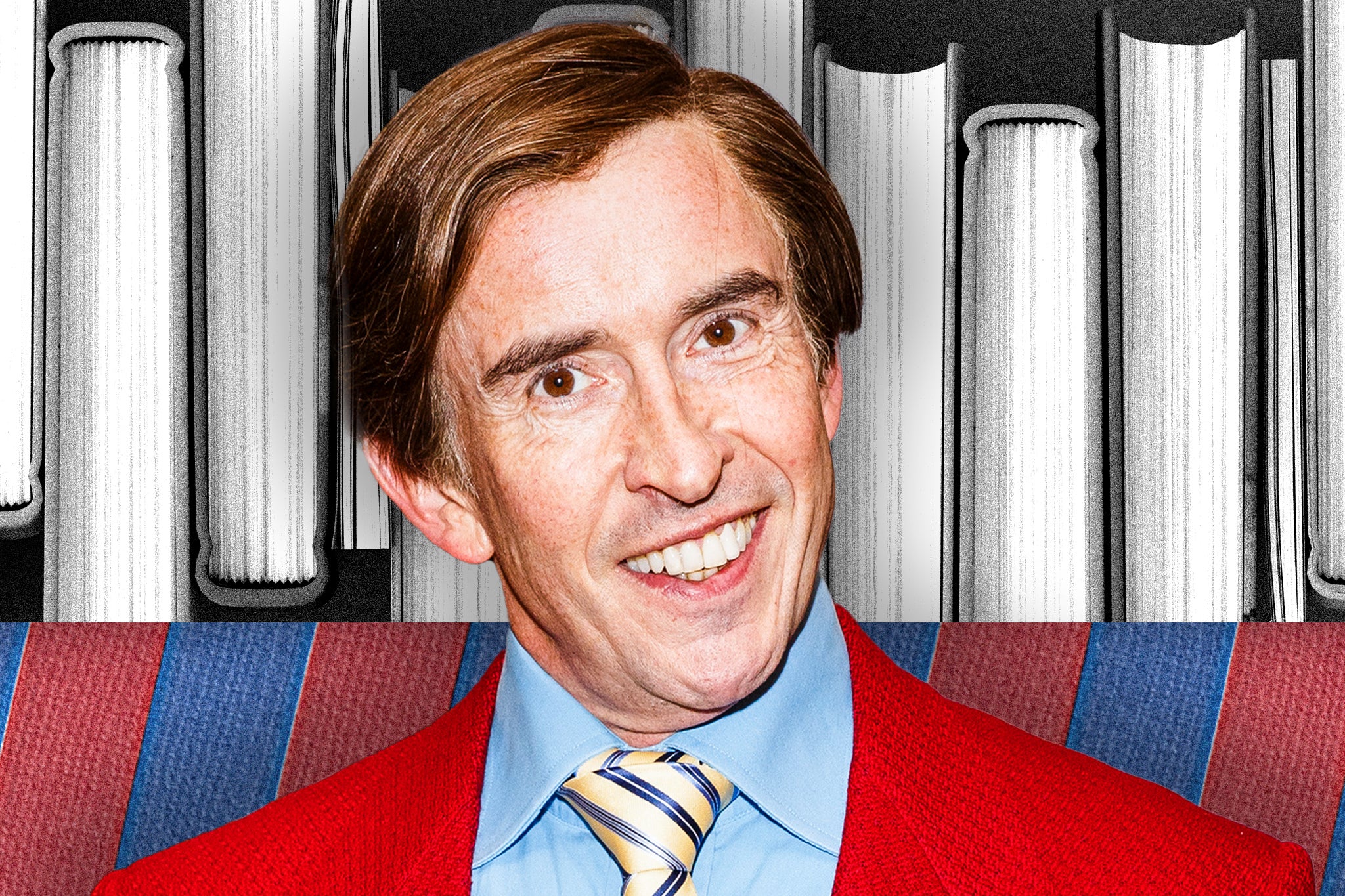From the Oasthouse: Alan Partridge is back again – could GB News be on the cards?
Over three decades, Steve Coogan’s fictional Norwich broadcaster has become the most defining character in British comedy. Nick Duerden talks to brothers Neil and Rob Gibbons about taking up the Partridge mantle, whether he’d ever go to GB News and why they’ll never kill him off


Like a particularly persistent virus that tends to prey on people during the colder months, Alan Partridge is back. The comic creation that simply won’t go away, who has had more comebacks since Status Quo, returns this autumn with an assault on various media fronts: we’ll be able to read him, and listen to him, quite possibly – but not necessarily advisedly – at the same time.
Firstly, this month the Norwich broadcaster presides over a further instalment of his hit podcast, From the Oasthouse, another multi-hour marathon of precision-tooled comedy in which he mulls over the topics of the day. Or, as one of its writers describes it, “the ramblings of a lonely man who doesn’t want you to know he’s lonely”. And then, in October, comes Big Beacon, the third instalment of his memoirs. (Did Winston Churchill manage three memoirs?) Big Beacon, so the blurb tells us, will use an innovative “dual narrative structure you sometimes see in films” to tell the story of how he rebuilt his TV career alongside rebuilding an old lighthouse to its former glory, “motivated by nothing more than respect for a quietly heroic old building that many take for granted, which some people think is a metaphor for Alan himself even though it’s not really for them to say”.
It’s impossible not to read that paragraph in Partridge’s voice, such is his over-familiarity. Though an entirely fictional character, first arriving on screens as a minor figure in 1994 news spoof The Day Today before getting his own chat show, Knowing Me Knowing You, Alan Partridge nevertheless feels acutely real, a part of the cultural firmament. Richard Madeley’s harmlessly insensitive stints on Good Morning Britain have been gleefully compared to Partridge, while the viral “Accidental Partridge” Twitter account is quick to jump on examples of everyday Partridgisms (a recent post was simply a screengrab of a morning TV show with the strapline “Live at the Pencil Museum!”). The character has stuck around for three decades, embedded phrases like “monkey tennis” and “Jurassic Park!” into the British comedy lexicon and won three Baftas for Steve Coogan, the man who plays him, so it’s little wonder that, on his most recent BBC prime time outing, This Time with Alan Partridge (2019-2021), Alan seemed quite so self-satisfied.
But how on earth has he done it? How has he sustained?
A key component of that consistency is the Gibbons brothers, Neil and Rob, who have spun comedy gold for Alan Partridge for the past 13 years. Sitting in his living room at home in south London, Rob Gibbons is explaining, like a science teacher to a classroom of rapt pupils, the character’s painstaking evolution.
“We’re about to enter the third stage of Partridge,” he says. “In Phase 1, back in the 1990s before we arrived, he was sort of a young fogey. By the time we got involved [in 2010], I guess you could call that his David Cameron era, when he was reluctantly entering middle age and realising he was right-wing while still wanting to appear liberal.”
To illustrate his liberalism, Partridge liked to announce that he had a gay friend. “And, of course, if you have to announce it, then you’re not really liberal at all, are you?” Rob says. “Anyway, he’s since moved on again, older still, and is straggling these two increasingly polarised camps while trying not to get cancelled.” Now that Partridge has a mainstream audience again – unlikely as that may seem, Gibbons concedes – he finds himself at a crossroads. “Should he make the full leap over onto the liberal side, or simply give in and join his mates on GB News?”
Neil now arrives on Zoom, speaking from his home in Stockport (“It’s the new Berlin,” he deadpans). He and his twin brother never interrupt one another but rather take over seamlessly from the next, which can make it difficult, afterwards, to discern exactly which of them is talking, and when. “While GB News is probably his inevitable destination,” Neil says, “Alan considers it a sort of elephant’s graveyard, the place where broadcasters go to die. And we’re not sure he’s quite ready for that yet.”
The brothers won’t be drawn on Partridge’s next TV chapter – a new series is currently mooted for next year – but then they haven’t got there yet. For the past few months, they’ve been immersed in writing the book and the podcast, which required from them hours and hours (and hours) of material. All this, I suggest, is an awful lot of Partridge.
“It is,” Rob agrees, his brother nodding. “But there are just so many avenues to explore with him, and across so much media, Alan wondering where he might fit in. It’s complicated for him. He struggles.”
There are just so many avenues to explore with Partridge
Neil and Rob Gibbons grew up in Cheshire, both avid fans of the TV sitcom. Non-identical twins who nevertheless share a verbal shorthand that, Rob concedes, “can sometimes make it difficult for outsiders”, they sent an unsolicited script to Steve Coogan’s production company Baby Cow in 2008, having long been fans – but not, they point out, “superfans” – of the character. Coogan liked what he read, and they’ve been umbilically linked on the project ever since.
“They were immediately great, and such a good fit,” recalls Armando Iannucci, Partridge co-creator, alongside Steve Coogan and Patrick Marber, when the character first appeared as a sports reporter, initially on Radio 4 in 1991 and later on BBC2’s The Day Today. “They came in with reams of material, and knew exactly how to write for him.”
“I vividly remember,” says Neil, “the first time we were in a room with Steve and Armando. We’d written a script, and then watched them take it apart and start over. We were very quiet, but Armando encouraged us to contribute. It’s been incredibly democratic ever since.”
The twins’ first-realised efforts on Partridge 2.0 was Mid Morning Matters in 2010, by which point the character had, to all intents and purposes, been in cold storage for almost eight years, like a forgotten Spitting Image puppet. The show had a soft launch online, initially airing in 15-minute weekly chunks, before later being screened on Sky. Since Partridge’s last outing in 1999, Coogan had repeatedly made it clear that he had tired of the role – calling it “an albatross” – and wanted to move on to different things. In Michael Winterbottom’s The Trip, in which he starred with Rob Brydon, the pair playing versions of themselves, much was made (by a needling Brydon) of the Partridge catchphrase “a-ha!”, and just how very weary Coogan had grown of it. To see him return, then, was a surprise, but Mid Morning Matters proved a masterpiece, achingly funny and laden with ever more pathos. Later series documented Alan’s increasing alienation from the modern world, never more so than in the scene in which he tries to book a single matinee ticket for a performance of Inception, but has trouble communicating this to the cinema’s automated ticket line.
The character’s staying power is also due in no small part, of course, to Coogan’s exquisite performance, bringing Alan to life in such methodical detail, and in so many lovely jumpers, but these days it’s the Gibbons who do the bulk of the writing – particularly for the podcasts and the books. Coogan comes in towards the end for tweaks and revisions, and to add the singular Coogan magic.

“To watch Steve in the studio improvise consistently at a very high quality is almost freakish,” Neil says. “It’s an amazing thing to witness.”
The success of Mid Morning Matters gave the team the necessary momentum to keep going. There followed a memoir in 2011, I, Partridge: We Need to Talk about Alan, and a year later came the one-off documentary, Welcome to the Places of My Life. In 2013, there was a film, Alpha Papa, and then another one-off documentary, a live tour, the podcasts, more books and, most recently, This Time with Alan Partridge. It’s clear that the Gibbons, who are 46 and otherwise lead ostensibly normal lives, each married with children, spend an awful lot of time in a very peculiar headspace.
“You know,” Iannucci says, “I haven’t been able to keep up with all their output. It’s incredible. I wouldn’t be surprised if they looked like shrivelled husks by now.”
Neil Gibbons – who looks just fine, incidentally – nevertheless says that, “writing for Alan really should carry a health warning. Each of us – me, Rob and Steve – spend a lot of time in a very small room pretending to be Alan, sometimes for many hours a day.”
Rob: “And that can’t be healthy. It can’t. But I think what we’re essentially trying to do here is a low-end comedy version of Richard Linklater’s Boyhood,” he says, referring to the 2014 Oscar-winning movie that was filmed in real time over 12 years, thus allowing its lead character to grow from boy to man. “And the older he gets, the more stories we have to tell, the more fun we can have.”
To watch Steve in the studio improvise consistently at a very high quality is almost freakish
They do get an occasional break from him, though. In 2022, they wrote The Witchfinder for the BBC, a bawdy comedy set in 1645 and starring Tim Key and Daisy May Cooper, and they’re currently adapting for TV a long-forgotten book by Eric Morecambe called The Reluctant Vampire. But the spectre of Partridge continues to lurk.
Do they, I wonder, ever get bored? Are they never tempted to kill him off?
There’s a moment’s silence from the both of them, and they share a frown that travels between Zoom squares. “I suppose there’s an element of making hay while the sun shines before AI comes along to steal all our jobs,” Neil says eventually, “but Alan is such a rich character. We never feel obliged to write for him. We continue to because we want to.”
Rob recalls a scene in Alpha Papa when Partridge was shot during a siege at the radio station. “We attended an early screening of the film with an audience, and when the gun went off there was a moment everyone thought he was actually dead. It prompted a lot of uncomfortable murmurings, and some genuine concern. It wasn’t a nice atmosphere. And so, no,” he concludes, “no plans to kill him off just yet.”
The obituary, when eventually it does come, will be a ruddy marvel.
‘From the Oasthouse’ is available now. ‘Big Beacon’ is published by Orion on 12 October
Join our commenting forum
Join thought-provoking conversations, follow other Independent readers and see their replies
Comments


Bookmark popover
Removed from bookmarks